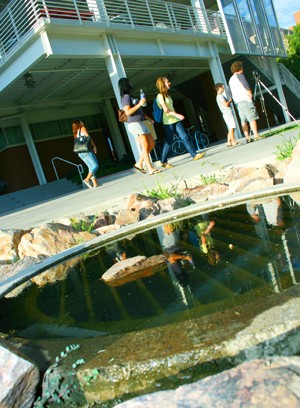West Nile virus may seem like a far-off concern for college students, somewhere behind classes and tuition, but in reality, it is a serious matter for all Arizona residents.
West Nile activity is on the rise. This is the time of year people can’t let their guard down,said Craig Levy, head of the Arizona Department of Health Service’s Vector-Borne and Zoonotic Diseases section. “”August and September, and even into October in these southern counties – it’s a high risk,”” he said.
According to Levy and the ADHS, Arizona has been stricken with 16 human cases this year: 13 in Maricopa County, two in Graham and one in Pima. This year has had only one fatal case, in Maricopa.
“”When cases get reported, we’re only about hearing about the tip of the iceberg,””Levy said. “”What get diagnosed and reported are the more severe cases. These are generally the people that end up being admitted to the hospital.””
What is left is a skewed view on the prevalence of West Nile in the Southwest, he added.
“”There’s a lot more people out there getting sick with West Nile that we’re not hearing about,”” Levy said. “”So those numbers are deceiving.””
“”West Nile is something we all should be aware of and take steps to prevent, but the risk it poses to the student population is small,”” said David Salafsky, interim director of health promotion and preventative services at Campus Health in an e-mail. To date, Campus Health has not diagnosed a single case of West Nile.
Despite a lack of West Nile presence on campus to date, students should not let their guard down against such a virus, Salafsky said.
He said the University of Arizona Risk Management and Faculties Management are working to prevent environments where mosquitoes can breed on campus.
He also said with the monsoons bringing rain, which in turn brings mosquitoes.
“”The key is eliminating standing water,”” Salafsky said. “”Empty bottles, cans or containers prior to disposing or recycling them and covering garbage and recycling bins.
“”If you live off-campus, maintaining your yard is a good first step to eliminate mosquitoes,”” he added.
Campus Health has also been trying to warn and inform students about the risk by distributing posters about West Nile and selling mosquito repellant at their pharmacy.
“”We do not expect an outbreak, but we have taken steps to prepare should we start should we start to see more cases locally,”” he said.
According to the ADHS, approximately 80 percent of people who become infected will have very mild or no symptoms at all. About 20 percent will develop flu-like symptoms that can persist for week.
“”It’s typically not a head cold type of disease,”” Levy said.
He mentioned confusion, disorientation, semi-comatose symptoms, severe muscle weakness or paralysis as possible signs of West Nile.
“”Something’s affecting the brain and should be checked out,””
Levy also said bad headache, fatigue and high fever may also be West Nile, but without involving the central nervous system.
The ADHS also warned that if symptoms do show up, alcohol should be avoided.
“”If you’re getting dehydrated, the last thing you should be doing is drinking alcohol,”” Levy said. “”Symptoms that go along with (West Nile) are nausea, vomiting… where you’re losing fluids. So if you’re drinking alcohol, you’re making it even worse.ÿ
“”But… the alcohol recommendation is not just West Nile related, it’s related to any illness that may cause you to dehydrate,”” he added.
While residents can take the necessary precautions to protect themselves, the unpredictability of the virus should cause all Arizona residents to stay alert, Levy said.
“”West Nile, like any mosquito-born disease, is going to have some mild years and not so mild years,”” he said. “”But it’s unpredictable.””
As for the future, Levy said, “”(West Nile) is going to be an annual and seasonal problem every year. It’s not going to go away.””









